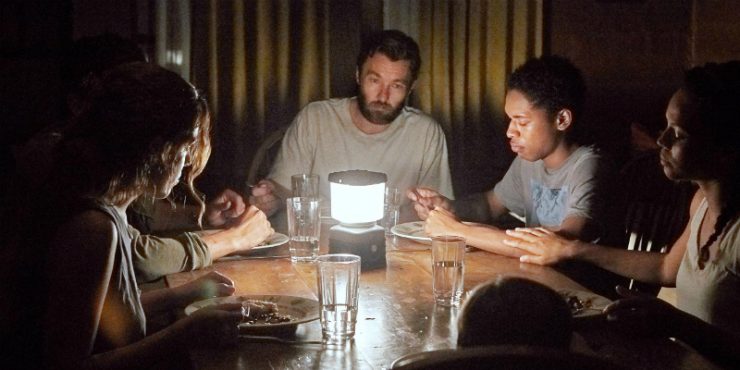Trey Edward Shults has only been in the cinematic consciousness for a little over a year, after his first feature, Krisha, came out in the Spring of 2016. That film was so incredible in such a sharp, concise way, it nearly felt like a miracle – the kind of self-sacrificing, autobiographical tale that is revealing and heartbreaking without feeling like an overshare or a memory dump. This Summer, we get his second film, It Comes At Night, a psychological horror film that is similar to Krisha is more ways than you might initially think. Both films dissect the horror of domesticity and the existential dread of familial routine. Both films are filmed and edited with such a striking expertise, scored with body-shaking music that fills you with unease. Shults doesn’t trust humanity the way his peers (and recent Oscar winners) Barry Jenkins and Damien Chazelle do; their cynicism always finds a very cinematic path toward enlightenment. Shults may be the perfect young director for this decade: he sees a world of chaos, a tempest of raw emotions hurtling toward an inevitable catastrophe.
It Comes At Night takes place during an ambiguous plague that has ravaged the planet Earth. Travis (Kelvin Harrison Jr.) lives with his father Paul (Joel Edgerton) and his mother Sarah (Carmen Ejogo), and they’ve developed a partial life in their secluded home in the woods. As the film opens, Sarah’s father Bud (David Pendleton) is very close to death, his skin covered in lesions, his eyes turned black – he’s succumbed to the plague. Paul and Travis dispose of Bud’s body after he dies and return to their functioning routine – a strict regiment that has kept them alive despite the outside horror. They have masks and gloves, they harvest their own food, clean their own water, and most importantly, they do not go out at night. The film’s opening is a stark statement: the chances of them escaping this world without getting sick is very slim, but they have gotten by by not thinking about the odds, but simply continuing on with their tasks and duties. That gets disturbed when they’re visited by Will (Christopher Abbott) who enters the home thinking its abandoned. Despite initial skepticism, Paul and Sarah decide to take in Will, as well as his wife Kim (Riley Keough) and their son Andrew (Griffin Robert Faulkner).
At first, their new co-tenants provide helping hands, alleviating the physical toll of their daily tasks, as well as bringing in healthy animals and other food. But neither family is able to get comfortable, nor does actual trust ever take root. Their odds of survival are better together, but their friendliness slowly gives way to fear and accusations. When Travis’ dog Stanley runs away from home one day, their structured ecosystem begins to truly crack as the two families have to begin deciding an exit strategy. Now, Shults never gives It Comes At Night the benefit of suggesting some form of antidote, or any other solution to the man-killing disease that has driven these people into this house. That doesn’t seem to be his point of interest. He’s interested in the dynamics of human beings in their most desperate. This seems most prevalent in Paul, a character so committed to survival and the protection of his family that he doesn’t seem to think much about their emotional well-being, nor does he seem to embrace the strong likelihood of their contamination. Life for Paul is an endless trudging forward, a constant finger on the trigger.
But the film is told through the point-of-view of Travis, a curious seventeen-year-old who likes his family’s new visitors, and struggles to match his father’s unwavered cautiousness. It’s hard to gauge how much of Travis’ life has been consumed by this lifestyle (we never learn how long the world has been this way), but he seems generous in a very child-like way, and when he speaks to Kim, its as if he’s never spoken to pretty girl in his entire life. Because Travis is black and Paul is white, the film leaves the question of Travis’ true parentage in a murky ambiguity – he calls Paul ‘Dad’ but also seems constantly leery of Paul’s fierce survivalism. Travis himself would probably take a more humanist approach. Travis cannot sleep and when he’s not having nightmares, he’s wandering his home. Kim and Will give Travis something undeniably new and exciting to spy on within his home. His voyeurism is the film’s most complicated aspect, and the one that’s most unaddressed.
With Krisha, Shults was working with non-professional actors, a lot of them members of his family. This probably influenced that film’s kinetic, scattershot editing style which cut around unrefined performances. Shults is working with a professional crop here and it shows in how he cuts his scenes. The takes are longer, the scenes are more dialogue driven. Edgerton is a master of these kinds of measured, thankless performances, and he plays his notes perfectly here. The rest of the ensemble thrives as well under Shults’ claustrophobic setting. Krisha‘s editing was one of the film’s strong points, and while It Comes At Night‘s cutting (by Shults and Matthew Hannam) is more subdued, it still shows his innate ability to create tension. With aid from cinematographer Drew Daniels and editor Matthew Hunnam, Shults has shown himself already to be master craftsman, already a peer with other great contemporary filmmakers like J.C. Chandor, Ava DuVernay and Jeff Nichols (as well as the aforementioned Jenkins and Chazelle). It Comes At Night‘s script sometimes relies a bit too much on ambiguity, and it writes itself into a third act that has nothing to hold onto but nihilism. But I get the sense that this was Shults’ plan all along. For a two-film career, he seems in complete control.
Written and Directed by Trey Edward Shults










